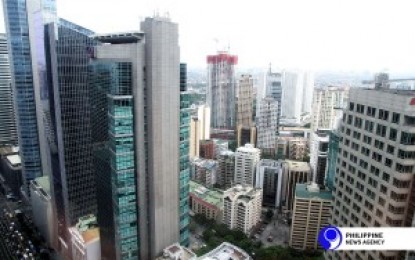
MANILA – An economist forecasts “some adjustments on the risk premiums” on the Philippines following Fitch Ratings’ decision on Monday to change from stable to negative its outlook on the economy’s BBB credit rating.
In a reply to e-mailed questions from PNA, Rizal Commercial Banking Corporation (RCBC) chief economist Michael Ricafort said the outlook downgrade on the country’s credit rating may result in “some uptick in local interest rates/credit costs and some healthy profit-taking in the local financial markets.”
“But hopefully, these would be minimal/negligible since there is still a chance to prevent an actual downgrade of the credit rating from happening in the coming months, as the Philippine would remain in the investment-grade universe, regardless of the outcome, especially if economic recovery prospects improve in view of the continued arrivals of more Covid-19 (coronavirus disease 2019) vaccines into the country that could help better manage, if not reduce, new Covid-19 local cases, and help justify additional measures to re-open the economy,” he said.
Fitch has kept the country’s credit rating at BBB, a notch above the minimum investment grade, which it has given since 2017.
It affirmed the rating after noting the country’s robust external buffers and the expectations that government debt levels will remain below BBB median peers.
Ricafort said the government’s decision to continue with the reopening of the economy is expected to counter the economic impact of the pandemic since this will boost the government’s tax revenue collections and reduce pandemic-related spending, which in turn, would lower budget deficit and slow the rise of the country’s liabilities.
He said while state spending increased because of programs aimed to reduce the impact of the virus-induced pandemic on the people and the economy, domestic fundamentals and the country’s external position remain strong.
“Thus, improved economic recovery prospects, that, in turn, would partly help improve the country's fiscal performance in terms of narrower budget deficits and slower increase in the country's debt stock, with the debt-to-GDP (gross domestic product) ratio could eventually ease/cure with faster GDP growth in the coming months/years, would all help prevent an actual downgrade of the country's credit ratings, as some countries worldwide have already been downgraded since the Covid-19 pandemic last year and the Philippines has so far been spared,” he said.
However, Ricafort said risks remain partly due to the relatively high number of domestic infections and the threat of more contagious variants, which could lead to risks of lockdown and travel restrictions.
The country got its first investment-grade rating in March 2013 when Fitch Ratings upgraded its rating on the country from BB+ to BBB- with a stable outlook.
This, after the debt watcher noted, among others, that the country’s balance sheet is comparable to those of A-rated countries and the shift of the country’s position as “net creditor” given the continued achievement of current account surpluses due to remittance inflows.
S&P also upgraded its rating on the country to investment grade, BBB- with a stable outlook, in May of the same year as well as Moody’s Investors Service, to Baa3 with a positive outlook, in October of the same year.
The country has, since then, received several more upgrades and even managed to keep its ratings and their outlooks in 2020 amidst downgrades for several countries due to the impact of the pandemic.
Ricafort said these positive rating actions helped reduce the country’s borrowing cost and lowered risk premiums, which allowed the government to have additional fiscal space and invest in more social safety net and infrastructure projects.
Socioeconomic Planning Secretary Karl Chua said the affirmation of the country’s credit rating “is a vote of confidence in the country’s economic and fiscal management despite the worst effects of the pandemic.”
“The negative outlook flags the risks that we are aware of, and the economic team will continue to exert effort to open the economy safely, manage risks from Covid, accelerate vaccine deployment, prudently use fiscal resources, and enact the remaining economic and fiscal reforms to further improve growth prospects,” he added.
Finance Secretary Carlos Dominguez III said while the impact of the pandemic on the economy is significant. “this will only be temporary.”
“In fact, the economy is already en route to a solid recovery path and is seen to have posted double-digit growth in the second quarter of this year amid the fast-track implementation of the vaccine rollout and economic recovery measures,” he said.
Economic managers have set a 6-7 percent growth target this year and a 7-9 percent target for next year.
Bangko Sentral ng Pilipinas (BSP) Governor Benjamin Diokno expects the economic impact of the pandemic to be transitory.
Diokno said “the sharp economic contraction last year was caused primarily by strict containment measures to prevent the spread of the virus, save lives, and increase the capacity of the healthcare system.”
“As the government accelerates the vaccination program and implements recovery measures, we expect the green shoots of recovery to further strengthen and the economy to return to its robust growth path,” he said.
Diokno said economic managers have recognized there are risks to the growth outlook.
“However, our solid fundamentals and ongoing reform initiatives should carry us through toward a solid rebound—to a state that is well-calibrated to the emerging new economy,” he added. (PNA)
